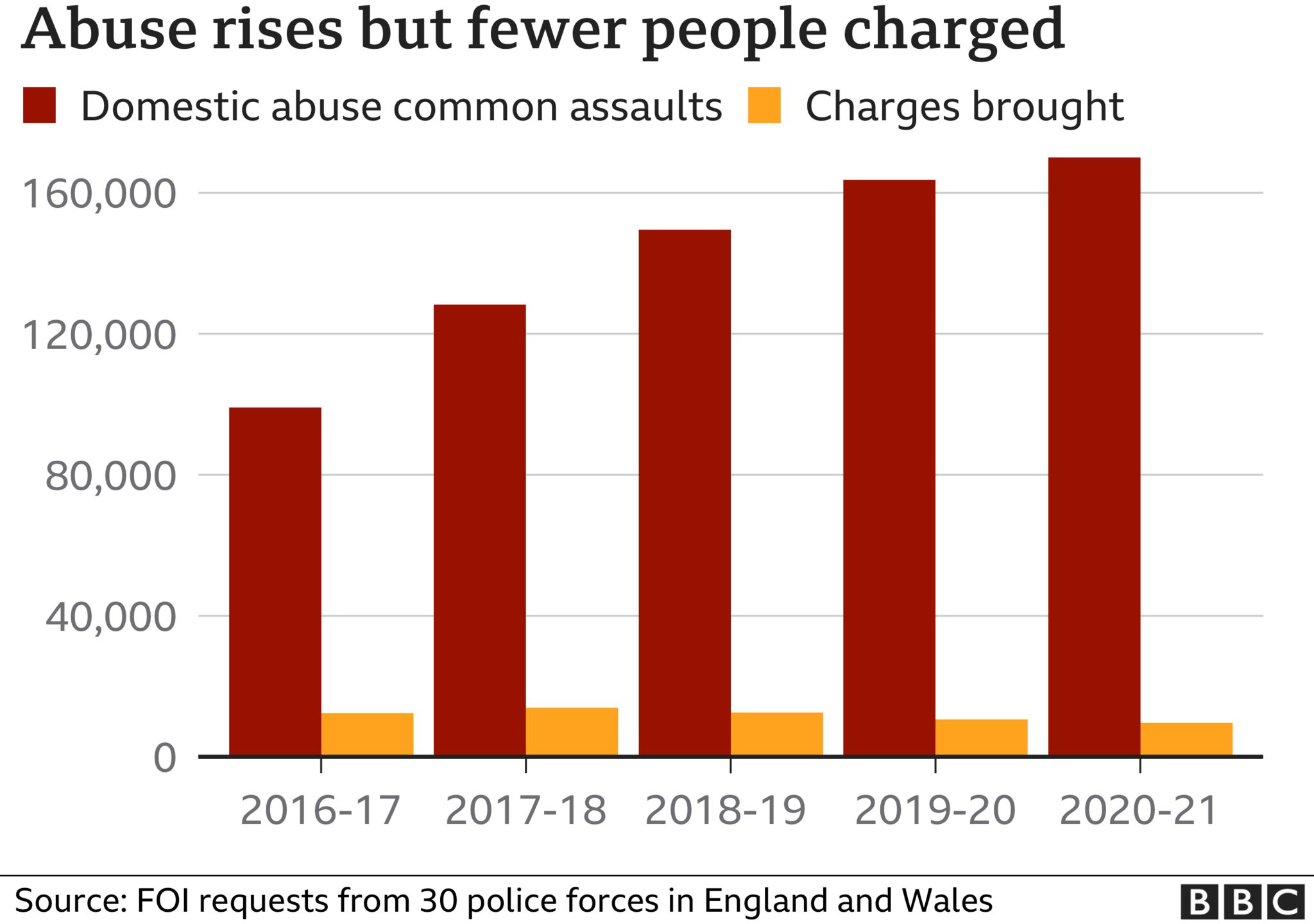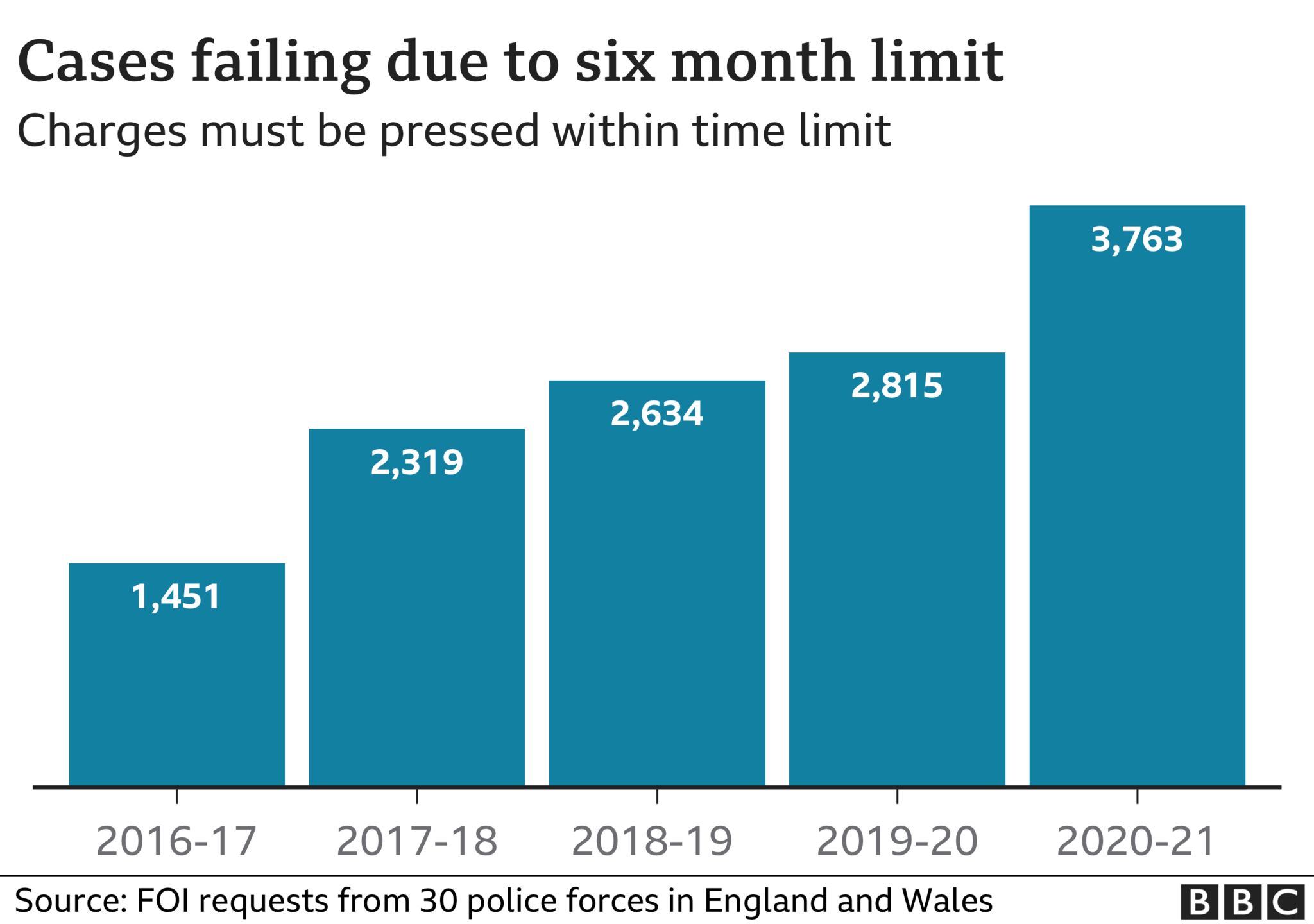Victims of alleged domestic abuse are seeing their cases dropped at a rapidly increasing rate, according to data obtained by the BBC.
The time limit to charge common assault – including instances of domestic violence – is six months.
Nearly 13,000 cases were dropped in England and Wales over five years after the authorities hit that limit.
Campaigners say women are being denied justice and the police and prosecutors should be given more time.
The new figures relate to common assault cases – which includes things like a push, threatening words or being spat at – and which are normally dealt with at magistrates court.
But three-quarters of all domestic abuse cases – including sexual assaults – are closed early without the suspect being charged, according to a report by HM inspector of constabulary.
And just 1.6% of rape allegations in England and Wales result in someone being charged, something the government has said it is “deeply ashamed” about.
Victims of domestic common assault are sometimes reluctant to come forward and the cases can be complex – which is why campaigners say the police should be given more time to investigate them.
A government spokesman said all allegations should be investigated and pursued where possible, and money had been invested to support victims of such crimes during the pandemic.
But Labour MP Yvette Cooper, who chairs the Commons Home Affairs Committee, said it was another example of the criminal justice system failing to understand violence against women and girls.


“This is a shocking fact that thousands of cases a year – and getting worse – are just being timed out,” she told BBC News.
“There are so many reasons why victims and survivors of domestic abuse might not be able to report an assault straight away. But then to be told that the perpetrator is just going to be let off because they’ve run out of time is completely wrong. That is why the law needs to change.”
The six-month time limit is meant to keep the criminal justice system moving – but campaigners are calling for it to be extended to two years in instances of domestic violence.
Erica Osakwe, who founded Victims Too, was encouraged to report her abuse to police on leaving her relationship, but was later told no charges could be brought because the police had failed to properly file the initial report and the time limit had expired.
She said: “There was a pit in my stomach that didn’t leave me for weeks or months. I felt like they took me for a joke. I wasn’t taken seriously. It didn’t seem like they’ve valued my story.
“To me, six months isn’t enough time to even fathom that sort of experience and allow someone to get the support they need before coming forward.
“This six months not only applies to victims of abuse but also applies to the police as well to get it done. The police might not be able to gather the evidence they need in the six months to even get that prosecution charge.”
Ms Osakwe and campaign group Refuge are backing moves by Ms Cooper to amend the Police, Crime, Sentencing and Courts Bill currently making its way through Parliament.
Figures obtained by the BBC using Freedom of Information from 30 of the 43 police forces in England and Wales, reveals a huge increase in allegations of common assault involving domestic abuse – but a fall in the number of charges being brought.
From 2016-17 to 2020-21 there were at least 12,982 cases of common assault that were flagged as involving domestic abuse in which no-one was charged due to the time limit.
There has been a 159% increase in the number of times common assaults flagged as involving domestic abuse have not been charged because of this time limit.
The data was not broken down by gender, and covers both men and women.


Between 2016-17 and 2020-21 the total number of common assaults flagged as instances of domestic abuse increased by 71% from 99,134 to 170,013.
In the same time period, the number of these common assaults that resulted in charges being brought fell by 23%.
A government spokesman said: “All allegations should be investigated and pursued rigorously through the courts where possible, and there is no time limit on reporting crimes such as bodily harm or those that add up to coercive behaviour.
“We have invested millions into vital services to support victims throughout the pandemic, and continue to urge anyone at risk of harm to come forward and get the help they need.
“Perpetrators of domestic abuse do untold damage and we sympathise with any victim whose life has been affected by such acts.”
Louisa Ralfe, the lead for domestic abuse at the National Police Chiefs’ Council, said: “We know there are many reasons why victims may not immediately report offences, particularly in cases of domestic abuse where victims can face coercion and other barriers to coming forward.
“We are supporting the Home Office in their analysis of this issue and we will continue to work with them and the Crown Prosecution Service to understand the scale and ensure that every victim is able to achieve the justice they deserve.”
